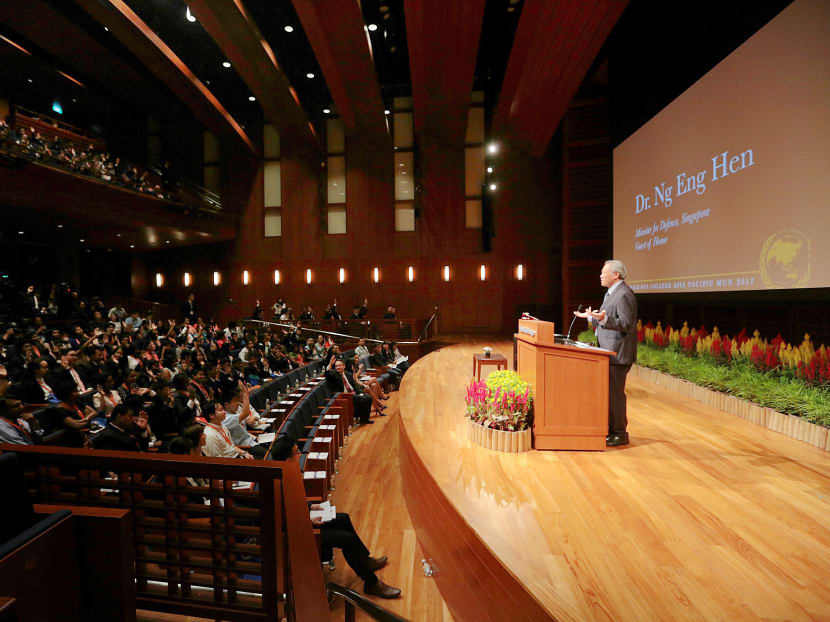S’pore must keep eye on fault lines as world hits turning point: Eng Hen
SINGAPORE — The pushback against globalisation, how countries would behave in a multi-polar world, and a rising tide of populism are some of the issues to be watchful of in the coming decades, said Defence Minister Ng Eng Hen on Friday (Jan 13), as he warned of a world at an inflexion point not seen since the fall of the Berlin Wall in 1989 which marked the end of the Cold War.

Students had a 45-minute dialogue with Defence Minister Ng Eng Hen after he delivered his keynote address at the Yale-NUS College Asia Pacific Model UN Conference on Jan 13, 2017. Photo: Jason Quah/TODAY
SINGAPORE — The pushback against globalisation, how countries would behave in a multi-polar world, and a rising tide of populism are some of the issues to be watchful of in the coming decades, said Defence Minister Ng Eng Hen on Friday (Jan 13), as he warned of a world at an inflexion point not seen since the fall of the Berlin Wall in 1989 which marked the end of the Cold War.
Dr Ng noted three fault lines that are coming under “severe pressure”, and could well spiral into social and political upheaval: Globalisation versus nationalism, global rules versus the regional order, and collective good governance versus individual rights.
“The ability to change and adapt seems to be so relevant today because I believe that the world as we know is at an inflexion point,” said Dr Ng at a conference held at Yale-NUS College. “We do not know what shape it will take in 2050 but of this we can be certain: Some fundamental rules will be changed, and with it the fate of nations.”
He was addressing more than 250 students from seven countries (including Singapore) attending the Asia Pacific Model United Nations conference. “Your generation will have ring-side seats to not only interesting times, but dramatic interludes where the world is being re-shaped,” he added.
Dr Ng noted there is a growing strain between those who champion globalisation and nationalists who want to protect jobs and stop immigration. These can be seen in British voters’ decision to leave the European Union, US President-elect Donald Trump’s victory, and the rise of anti-EU parties in Europe.
While expanding global trade has grown wealth and driven down poverty, “it’s very hard to convince a worker who has lost his job of these benefits”, he noted. He added that the “backlash against globalisation is emotional and will take time to resolve”.
The question of “who sets global rules” represents the second faultline, said Dr Ng, noting that the days of the US being the sole global power with an unprecedented commercial heft and military reach is under challenge.
Historically, regional politics has also exerted a dominant force, he added. And in this interplay, whether rules could change as bigger countries, such as China, India and Indonesia rise, was something to think about, he noted.
“Can a global system, can citizens of the world operate under global trade, commerce, and security interests within a multi-polar world?” Dr Ng asked.
The third fault line lies between favouring collective good governance and paying attention to individual rights, said Dr Ng.
The rising tide of populism has meant that individual interests must now be given greater attention, he added.
“If all individual interests are taken into account, the shared interests must necessarily shrink. That kind of domestic politics will polarise communities as we are witnessing today,” Dr Ng said.
“So if you’re a political party and you want majority or popular support, I can’t have a central platform. I have to cater to many, many small interests, bring them together and hope that I can win the popular vote by a slim majority or by coalitions… but at the expense of an inclusive ideology and at the price of an ever reducing common space,” he added.
Amid these trends, Singapore needs to revisit questions its founding leaders faced, of how to stay relevant and create good jobs, how a small state like it can help shape the world, and how to avoid the divisiveness that arises from populism.
While the country is in a much stronger position than during its founding years, Dr Ng said the next generation will need to make “wise and enlightened decisions” to ensure Singapore’s place in the 21st century, said Dr Ng.






